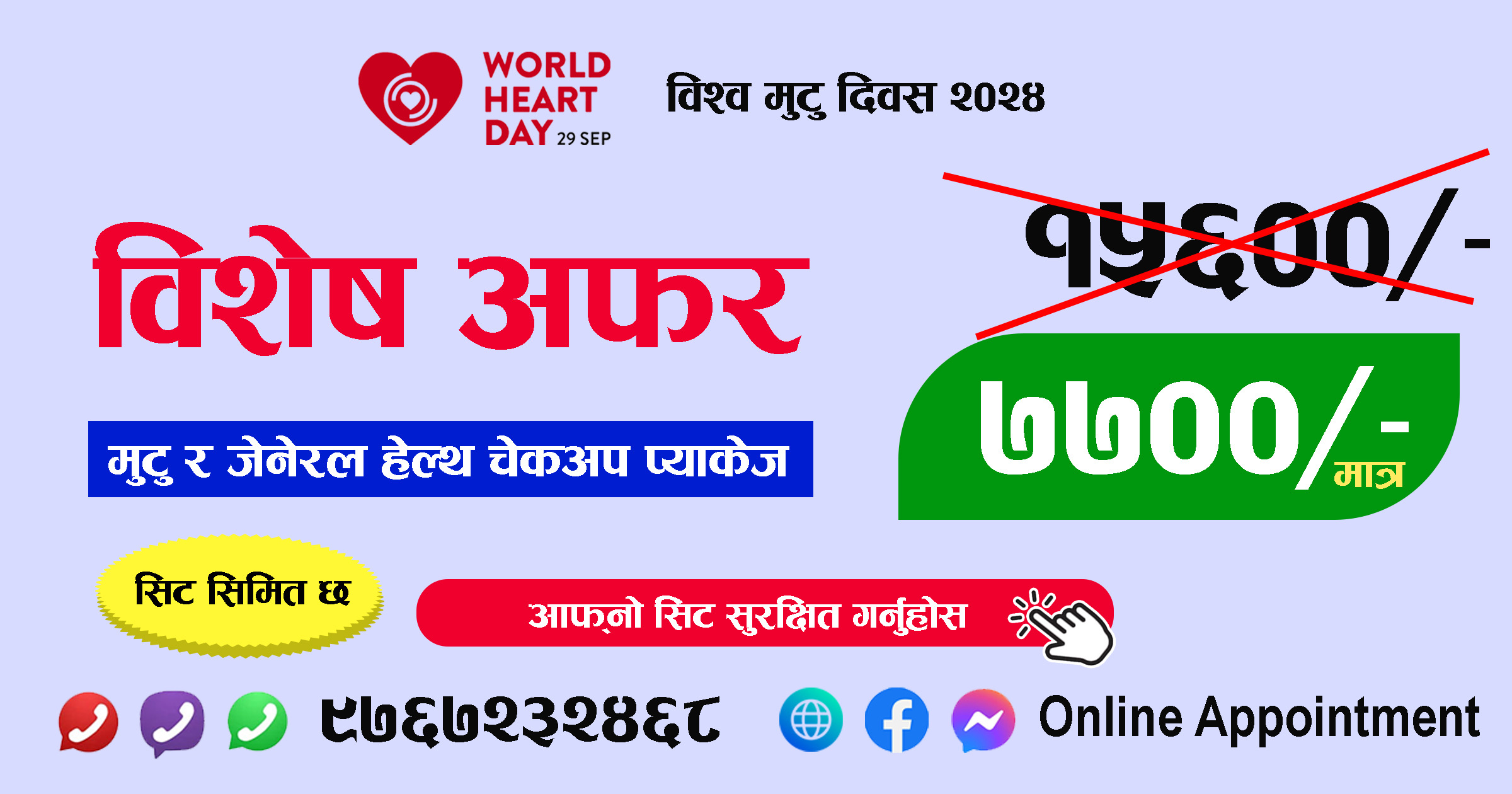
Department : Cardiology
Price:
Rs.15600
Rs. 7800
Fasting Required? : Yes
Requirements : Whole Body Check up cheapest low price
Home Services Available? : No
Whole Body Checkup
The Full Body Checkup is a comprehensive health screening package designed to offer an extensive evaluation of your overall health. By combining a variety of diagnostic tests, this package provides a detailed snapshot of your body’s systems, enabling early detection of potential health issues. This proactive approach is crucial for preventive care and maintaining a high quality of life.
Benefits
1. Early Detection
Identifies potential health issues before symptoms appear, allowing for timely intervention and treatment.
2. Comprehensive Overview
Evaluates various bodily systems including cardiovascular, metabolic, and musculoskeletal health.
3. Personalized Insights
Offers detailed reports and tailored recommendations based on your specific health needs.
4. Prevention Focused
Helps implement preventive measures to maintain optimal health and prevent chronic diseases.
5. Peace of Mind
Provides a clear picture of your current health status and future risks.
Tests Included
Cardiovascular Assessments
Electrocardiogram (EKG/ECG)
Purpose: Measures the electrical activity of the heart.
Benefits: Detects arrhythmias, heart attacks, and other heart conditions.
Echocardiography
Purpose: Uses ultrasound to create images of the heart's chambers, valves, and blood flow.
Benefits: Assesses heart function, detects structural abnormalities, and monitors heart disease progression.
Kidney Function Tests (KFT)
Urea
Purpose: Measures the amount of urea in the blood.
Benefits: Indicates kidney function and helps diagnose kidney disease.
Creatinine
Purpose: Measures the level of creatinine in the blood.
Benefits: Assesses kidney function and identifies potential kidney problems.
Sodium
Purpose: Measures sodium levels in the blood.
Benefits: Helps evaluate fluid balance and kidney function.
Potassium
Purpose: Measures potassium levels in the blood.
Benefits: Important for maintaining proper cell function and heart health.
Urinalysis
Urine Routine Examination (URE)
Purpose: Analyzes the physical, chemical, and microscopic properties of urine.
Benefits: Detects urinary tract infections, kidney disease, and other conditions.
Urine Microscopy
Purpose: Examines urine under a microscope.
Benefits: Identifies cells, crystals, and microorganisms that can indicate various health issues.
Cardiometabolic Tests
Lipid Profile
- Total Cholesterol : Measures overall cholesterol levels.
- Triglycerides (TG) : Assesses fat levels in the blood.
- High-Density Lipoprotein (HDL) : Known as “good” cholesterol; helps reduce heart disease risk.
- Low-Density Lipoprotein (LDL) : Known as “bad” cholesterol; high levels can lead to heart disease.
- Very-Low-Density Lipoprotein (VLDL) : Contains a high amount of triglycerides.
- Total Cholesterol/HDL Ratio : Evaluates cardiovascular risk.
- LDL/HDL Ratio : Provides insight into heart disease risk.
- Blood Sugar : Measures glucose levels in the blood to assess diabetes risk.
Lungs
Chest X-Ray (CXR)
Purpose: Provides images of the lungs and chest cavity.
Benefits: Helps diagnose lung diseases, infections, and other chest conditions.
Blood Tests
Complete Blood Count (CBC)
Purpose: Measures various components of the blood including red blood cells, white blood cells, and platelets.
Benefits: Evaluates overall health, detects anemia, and identifies infections or blood disorders.
Minerals
Magnesium
Purpose: Measures magnesium levels in the blood.
Benefits: Essential for muscle and nerve function, and helps diagnose magnesium deficiencies or excesses.
Chloride
Purpose: Measures chloride levels in the blood.
Benefits: Maintains proper fluid balance and acid-base balance in the body.
Phosphorus
Purpose: Measures phosphorus levels in the blood.
Benefits: Important for bone health and energy production.
Bone and Joint Health
Calcium
Purpose: Measures calcium levels in the blood.
Benefits: Essential for bone health and muscle function.
Uric Acid
Purpose: Measures uric acid levels in the blood.
Benefits: Helps diagnose gout and monitor kidney function.
Alkaline Phosphatase (ALP)
Purpose: Measures enzyme levels that indicate bone and liver health.
Benefits: Helps assess bone diseases and liver conditions.
Thyroid Function
Thyroid-Stimulating Hormone (TSH)
Purpose: Measures levels of TSH in the blood.
Benefits: Evaluates thyroid gland function and helps diagnose thyroid disorders such as hypothyroidism or hyperthyroidism.
Vitamins
Vitamin B12
Purpose: Measures vitamin B12 levels in the blood.
Benefits: Essential for red blood cell formation and neurological function.
Vitamin D
Purpose: Measures vitamin D levels in the blood.
Benefits: Important for bone health and immune function.
Doctor Consultation
Overview
Purpose: Provides a review of test results and recommendations.
Benefits: Offers personalized advice, further evaluations, and treatment plans based on test findings.
Preparations
Fasting
- Some tests require fasting for 8-12 hours before the appointment. Follow specific instructions provided to ensure accurate results.
Hydration
- Drink plenty of water unless instructed otherwise. Proper hydration is crucial for accurate test results.
Medication
- Inform your healthcare provider about any medications or supplements you are taking. They will advise if any adjustments are needed before testing.
Clothing
- Wear comfortable, loose-fitting clothing. You may need to change into a gown for certain tests.
Medical History
- Prepare to provide a detailed medical history and any relevant family history to assist with the interpretation of your results.
FAQs
1. How often should I get a Whole Body Test?
The frequency depends on your age, health status, and risk factors. Generally, a full screening every 1-2 years is recommended. Consult your healthcare provider for personalized advice.
3. How long does the Whole Body Test take?
The duration varies but typically ranges from 2 to 4 hours, depending on the tests included.
4. What happens if abnormal results are found?
Your healthcare provider will discuss any abnormal results and recommend further evaluation or treatment as necessary.
5. Is the Whole Body Test safe?
Yes, the tests are generally safe. Consult with your healthcare provider if you have specific health concerns or conditions.
6. Can I eat and drink before the test?
Some tests require fasting. Follow the specific instructions provided to ensure accurate results. For other tests, proper hydration is important.
In conclusion, the Whole Body Test offers a thorough and proactive approach to health screening. By encompassing a wide range of diagnostic tests, it helps in the early detection of potential issues and provides a comprehensive understanding of your overall health.